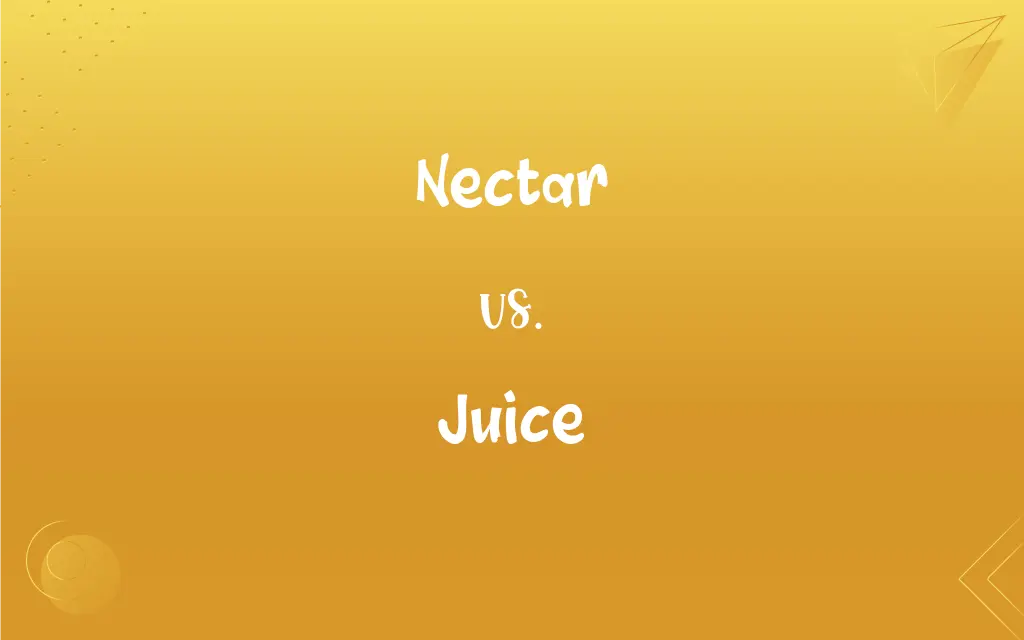Nectar vs. Juice: What's the Difference?
Edited by Harlon Moss || By Janet White || Published on November 8, 2023
Nectar is the sugary fluid produced by plants to attract pollinators; juice is the liquid extracted from fruits, vegetables, or plants for consumption.

Key Differences
Nectar is primarily known as the sweet secretion from flowers that serves as an incentive for pollinators like bees, hummingbirds, and butterflies. This sugary liquid plays a pivotal role in the plant-pollinator relationship, ensuring the continuation of many plant species. On the other hand, juice refers to the fluid that's squeezed or pressed from fruits, vegetables, or certain plants, often consumed by humans for its nutritional and flavorful properties.
While nectar is integral to the reproductive strategy of flowering plants, humans also utilize it indirectly, as when bees transform nectar into honey. Contrarily, juice is more directly linked to human consumption, offering a range of vitamins and minerals essential to our health. Whether it's orange juice at breakfast or celery juice for a health boost, its role in our diet is significant.
In the beverage industry, the term nectar can also refer to a sweetened fruit drink that contains fruit pulp. This usage diverges from its botanical meaning but still retains the concept of a sweet liquid. Conversely, juice in this context remains consistent with its primary definition, denoting a drink made primarily from the natural liquid of fruits or vegetables.
While nectar and juice both pertain to plant-derived liquids, their origins and primary purposes are distinct. Nectar is nature's method of facilitating pollination, whereas juice is an extract consumed for pleasure and nourishment by various creatures, including humans.
Comparison Chart
Primary Source
Flowers and plants
Fruits, vegetables, and certain plants
ADVERTISEMENT
Purpose in Nature
Attract pollinators
Store nutrients for the plant
Human Consumption
Indirect (e.g., through honey)
Direct (e.g., fruit juice)
Consistency
Often thinner and sweeter
Can be clear to pulpy based on extraction method
Usage in Beverages
Refers to sweetened fruit drink with pulp
Pure extraction from fruits or vegetables
Nectar and Juice Definitions
Nectar
A substance offering delightful or invigorating qualities.
For many, coffee is the morning nectar.
ADVERTISEMENT
Juice
Vital energy or essence.
After a long day, he felt like he had no juice left.
Nectar
Any sweet or pleasant liquid.
The tropical drink tasted like pure nectar.
Juice
Informal term for electricity or power.
The batteries are low; they've run out of juice.
Nectar
A sweetened fruit drink often containing pulp.
I love peach nectar because of its thick consistency.
Juice
Information or gossip.
She has the juice on the latest office drama.
Nectar
Sugary fluid produced by flowers to attract pollinators.
Hummingbirds are drawn to the nectar in bright-colored flowers.
Juice
A fluid naturally contained in plant or animal tissue
Fruit juice.
Meat braised in its own juices.
Nectar
Ambrosial food or drink of the gods in mythology.
In ancient tales, gods consumed nectar and ambrosia.
Juice
A bodily secretion
Digestive juices.
Nectar
A sweet liquid that many plants secrete from specialized structures, often inside flowers, where it serves to attract pollinators such as certain insects and birds. Bees use nectar to make honey.
Juice
The liquid contained in something that is chiefly solid.
Nectar
Greek & Roman Mythology The drink of the gods.
Juice
A beverage made from fruit juice or fruit-flavored syrup that is often combined with sweeteners, water, or other ingredients.
Nectar
A beverage containing fruit juice or purée.
Juice
A substance or quality that imparts identity and vitality; essence.
Nectar
A delicious or invigorating drink.
Juice
(Slang) Vigorous life; vitality.
Nectar
The drink of the gods.
Juice
(Slang) Political power or influence; clout.
Nectar
(by extension) Any delicious drink, now especially a type of sweetened fruit juice.
Juice
Electric current.
Nectar
(botany) The sweet liquid secreted by flowers to attract pollinating insects and birds.
Juice
Fuel for an engine.
Nectar
(intransitive) To feed on nectar.
Juice
(Slang) Funds; money.
Nectar
The drink of the gods (as ambrosia was their food); hence, any delicious or inspiring beverage.
Juice
Alcoholic drink, especially liquor.
Nectar
A sweetish secretion of blossoms from which bees make honey.
Juice
A substance, such as a steroid, taken to enhance performance in an athletic event.
Nectar
A sweet liquid secretion that is attractive to pollinators
Juice
A usually flavored liquid prepared for use in an e-cigarette or similar device.
Nectar
Fruit juice especially when undiluted
Juice
(Slang) Racy or scandalous gossip.
Nectar
(classical mythology) the food and drink of the gods; mortals who ate it became immortal
Juice
To extract the juice from.
Juice
To drink alcoholic beverages excessively.
Juice
To take a steroid or other substance to enhance athletic performance.
Juice
(uncountable) A liquid from a plant, especially fruit.
Squeeze the orange and some juice will come out.
Juice
(countable) A beverage made of juice.
I’d like two orange juices please.
Juice
(uncountable) Any liquid resembling juice.
Moo juice
Juice
(Scotland) A soft drink.
Juice
Liquor.
Juice
(informal) The liquid that is used to submerge a substance kept in a container
[[sauerkraut juice (the brine in a jar of sauerkraut)
Juice
(slang) The leftover liquid of some wet or damp substance.
Dumpster juice (liquid which oozes out of garbage dumpsters)
Juice
Vitality, strength.
Juice
Political power.
Juice
Petrol; gasoline.
Juice
Electricity.
Juice
Steroids.
Juice
Semen.
Juice
The vaginal lubrication that a female naturally produces when sexually aroused.
Juice
The amount charged by a bookmaker for betting services.
Juice
Musical agreement between instrumentalists.
Juice
(transitive) To extract the juice from something.
Juice
(transitive) To energize or stimulate something.
Juice
To take a performance-enhancing drug.
Juice
Alternative spelling of Jew's (used in certain set phrases like juice harp)
Juice
The characteristic fluid of any vegetable or animal substance; the sap or part which can be expressed from fruit, etc.; the fluid part which separates from meat in cooking.
An animal whose juices are unsound.
The juice of July flowers.
The juice of Egypt's grape.
Letters which Edward Digby wrote in lemon juice.
Cold water draws the juice of meat.
Juice
To moisten; to wet.
Juice
The liquid part that can be extracted from plant or animal tissue
Juice
Energetic vitality;
Her creative juices were flowing
Juice
Electric current;
When the wiring was finished they turned on the juice
Juice
Any of several liquids of the body;
Digestive juices
Juice
Liquid extracted from fruits, vegetables, or plants.
She squeezed fresh orange juice for breakfast.
Juice
Liquid content in animal tissues or bodily fluids.
The steak was oozing juice on the plate.
FAQs
Can juice be made from any fruit or vegetable?
Most fruits and many vegetables can be juiced, but the taste and texture will vary.
How do bees use nectar?
Bees collect nectar to make honey, their primary food source.
What creatures primarily consume nectar?
Nectar is primarily consumed by pollinators like bees, butterflies, and hummingbirds.
Is tomato juice made from the entire tomato?
Tomato juice is primarily made from the pulp, but some preparations might include skins and seeds.
Is nectar always sweet?
Nectar is typically sweet due to its sugar content, which attracts pollinators.
Do all flowers produce nectar?
No, not all flowers produce nectar. Only nectar-producing flowers attract pollinators that feed on nectar.
How is fruit nectar different from fruit juice in beverages?
Fruit nectar is often sweetened and contains fruit pulp, while fruit juice is typically the pure extraction from the fruit.
Can juice be fermented?
Yes, juice, especially from fruits like grapes and apples, can be fermented to produce alcoholic beverages.
Are there health benefits to drinking juice?
Yes, many juices are rich in vitamins and minerals, but it's essential to be wary of added sugars.
Can nectar be consumed directly by humans?
While nectar is edible, it's typically consumed indirectly, like when bees transform it into honey.
Is juice from concentrate as nutritious as fresh juice?
Juice from concentrate might lose some nutrients during processing, but manufacturers often fortify them.
Which juices are most acidic?
Citrus juices, like orange and grapefruit, are among the most acidic.
Can plants benefit from their nectar?
While nectar primarily serves pollinators, plants benefit indirectly as pollinators aid in their reproduction.
Why do some plants produce nectar?
Nectar attracts pollinators, which helps in the plant's reproductive process.
What's a common byproduct of juicing?
Pulp is a frequent byproduct, which can be used in cooking or composted.
Is the nectar found in grocery stores the same as botanical nectar?
No, nectar in grocery stores refers to sweetened fruit drinks, often containing pulp, not the nectar from flowers.
Are nectar and honey the same?
No, bees collect nectar and convert it into honey through a process involving enzymes and evaporation.
Can all fruits be turned into juice?
While most fruits can be juiced, some, like bananas, are typically not juiced due to their consistency.
Can juice be frozen for later use?
Yes, you can freeze juice, but the texture or taste might change upon thawing.
Is nectar only found in flowers?
While commonly associated with flowers, some plants produce nectar in other parts to attract ants for protection.
About Author
Written by
Janet WhiteJanet White has been an esteemed writer and blogger for Difference Wiki. Holding a Master's degree in Science and Medical Journalism from the prestigious Boston University, she has consistently demonstrated her expertise and passion for her field. When she's not immersed in her work, Janet relishes her time exercising, delving into a good book, and cherishing moments with friends and family.
Edited by
Harlon MossHarlon is a seasoned quality moderator and accomplished content writer for Difference Wiki. An alumnus of the prestigious University of California, he earned his degree in Computer Science. Leveraging his academic background, Harlon brings a meticulous and informed perspective to his work, ensuring content accuracy and excellence.
































































